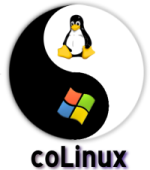
A Linux distribution is an operating system that includes the Linux kernel for its kernel functionality. Although the name does not imply product distribution per se, a distro, if distributed on its own, is often obtained via a website intended specifically for the purpose. Distros have been designed for a wide variety of systems ranging from personal computers to servers and from embedded devices to supercomputers.
Darwin is the core Unix-like operating system of macOS, iOS, watchOS, tvOS, iPadOS, audioOS, visionOS, and bridgeOS. It previously existed as an independent open-source operating system, first released by Apple Inc. in 2000. It is composed of code derived from NeXTSTEP, FreeBSD, other BSD operating systems, Mach, and other free software projects' code, as well as code developed by Apple. Darwin's official mascot is Hexley the Platypus.

Cooperative Linux, abbreviated as coLinux, is software which allows Microsoft Windows and the Linux kernel to run simultaneously in parallel on the same machine.

XNU is the computer operating system (OS) kernel developed at Apple Inc. since December 1996 for use in the Mac OS X operating system and released as free and open-source software as part of the Darwin OS, which, in addition to being the basis for macOS, is also the basis for Apple TV Software, iOS, iPadOS, watchOS, visionOS, and tvOS.
HFS Plus or HFS+ is a journaling file system developed by Apple Inc. It replaced the Hierarchical File System (HFS) as the primary file system of Apple computers with the 1998 release of Mac OS 8.1. HFS+ continued as the primary Mac OS X file system until it was itself replaced with the Apple File System (APFS), released with macOS High Sierra in 2017. HFS+ is also one of the formats supported by the iPod digital music player.

Git is a distributed version control system that tracks versions of files. It is often used to control source code by programmers who are developing software collaboratively.
In software development, distributed version control is a form of version control in which the complete codebase, including its full history, is mirrored on every developer's computer. Compared to centralized version control, this enables automatic management branching and merging, speeds up most operations, improves the ability to work offline, and does not rely on a single location for backups. Git, the world's most popular version control system, is a distributed version control system.

A free and open-source graphics device driver is a software stack which controls computer-graphics hardware and supports graphics-rendering application programming interfaces (APIs) and is released under a free and open-source software license. Graphics device drivers are written for specific hardware to work within a specific operating system kernel and to support a range of APIs used by applications to access the graphics hardware. They may also control output to the display if the display driver is part of the graphics hardware. Most free and open-source graphics device drivers are developed by the Mesa project. The driver is made up of a compiler, a rendering API, and software which manages access to the graphics hardware.

Mercurial is a distributed revision control tool for software developers. It is supported on Microsoft Windows, Linux, and other Unix-like systems, such as FreeBSD and macOS.
Squashfs is a compressed read-only file system for Linux. Squashfs compresses files, inodes and directories, and supports block sizes from 4 KiB up to 1 MiB for greater compression. Several compression algorithms are supported. Squashfs is also the name of free software, licensed under the GPL, for accessing Squashfs filesystems.

Wireless network cards for computers require control software to make them function. This is a list of the status of some open-source drivers for 802.11 wireless network cards.

Linux is a family of open-source Unix-like operating systems based on the Linux kernel, an operating system kernel first released on September 17, 1991, by Linus Torvalds. Linux is typically packaged as a Linux distribution (distro), which includes the kernel and supporting system software and libraries—many of which are provided by the GNU Project—to create a complete operating system, designed as a clone of Unix and released under the copyleft GPL license.
This is a technical feature comparison of different disk encryption software.

The Linux Foundation (LF) is a non-profit organization established in 2000 to support Linux development and open-source software projects.

The Linux kernel is a free and open source, UNIX-like kernel that is used in many computer systems worldwide. The kernel was created by Linus Torvalds in 1991 and was soon adopted as the kernel for the GNU operating system (OS) which was created to be a free replacement for Unix. Since the late 1990s, it has been included in many operating system distributions, many of which are called Linux. One such Linux kernel operating system is Android which is used in many mobile and embedded devices.
OpenWrt is an open-source project for embedded operating systems based on Linux, primarily used on embedded devices to route network traffic. The main components are Linux, util-linux, musl, and BusyBox. All components have been optimized to be small enough to fit into the limited storage and memory available in home routers.

OpenZFS is an open-source implementation of the ZFS file system and volume manager initially developed by Sun Microsystems for the Solaris operating system, and is now maintained by the OpenZFS Project. Similar to the original ZFS, the implementation supports features like data compression, data deduplication, copy-on-write clones, snapshots, RAID-Z, and virtual devices that can create filesystems that span multiple disks.
Besides the Linux distributions designed for general-purpose use on desktops and servers, distributions may be specialized for different purposes including computer architecture support, embedded systems, stability, security, localization to a specific region or language, targeting of specific user groups, support for real-time applications, or commitment to a given desktop environment. Furthermore, some distributions deliberately include only free software. As of 2015, over four hundred Linux distributions are actively developed, with about a dozen distributions being most popular for general-purpose use.
Microsoft, a tech company historically known for its opposition to the open source software paradigm, turned to embrace the approach in the 2010s. From the 1970s through 2000s under CEOs Bill Gates and Steve Ballmer, Microsoft viewed the community creation and sharing of communal code, later to be known as free and open source software, as a threat to its business, and both executives spoke negatively against it. In the 2010s, as the industry turned towards cloud, embedded, and mobile computing—technologies powered by open source advances—CEO Satya Nadella led Microsoft towards open source adoption although Microsoft's traditional Windows business continued to grow throughout this period generating revenues of 26.8 billion in the third quarter of 2018, while Microsoft's Azure cloud revenues nearly doubled.

SerenityOS is a free and open source desktop operating system. It features a preemptive kernel, currently supports x86-64 based computers, and hosts multiple complex applications including its own web browser and integrated development environment (IDE). Development started in 2018—initially as a one-man project of Swedish programmer Andreas Kling—and is now developed by a community of hobbyists. The project is hosted at GitHub and is described as being not catered to "non-technical users".











